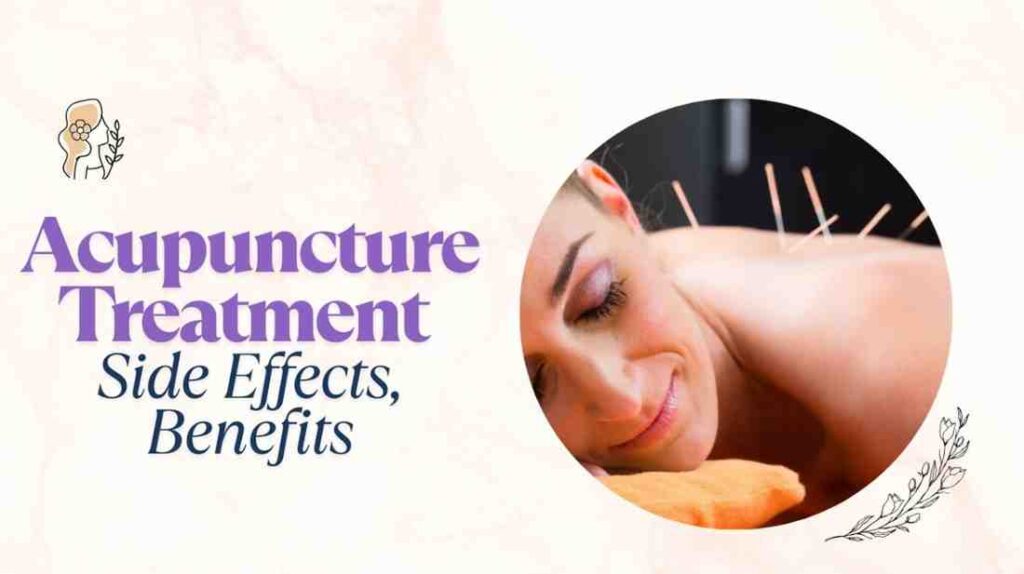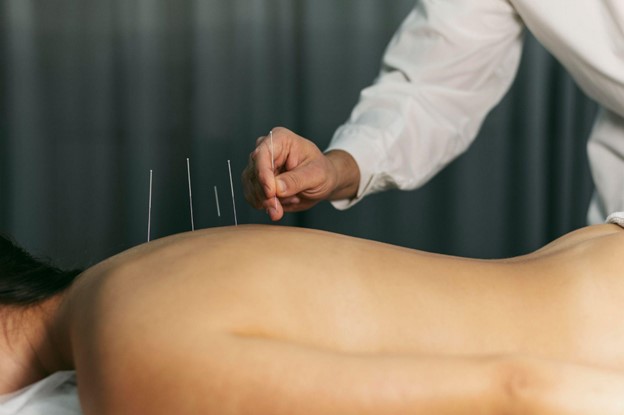Last updated on May 20th, 2025 at 11:55 am

Acupuncture Treatment – Acupuncture is a traditional Chinese healing art dating back over two millennia, involves the insertion of thin needles into specific points on the body to promote the flow of vital energy, known as Qi. Rooted in the belief that disruptions in this energy flow can lead to various health issues, acupuncture aims to restore balance by stimulating specific meridian points.
The process is generally painless, with the fine needles causing minimal discomfort. Widely recognized for its versatility, acupuncture has been employed to alleviate a spectrum of conditions, ranging from chronic pain and stress to digestive disorders and women’s health issues. Its increasing popularity in the West has spurred scientific research, shedding light on potential mechanisms underlying its effectiveness.
Acupuncture stands as a holistic approach, offering individuals a unique avenue for healing and well-being that integrates ancient wisdom with contemporary understanding.
What is Acupuncture?
Acupuncture is based on the belief that the body’s vital energy, Qi, flows through a network of meridians. The practitioner identifies specific points on these meridians, each associated with a particular organ or bodily function. By inserting thin needles into these points, the practitioner seeks to correct imbalances in Qi, restore energy flow, and alleviate various health issues.
The needles used in acupuncture are extremely thin, typically causing minimal discomfort. The process is generally painless, and many individuals find the experience relaxing. Acupuncture sessions can last anywhere from 20 minutes to an hour, depending on the specific needs and conditions of the individual.

Treatment of Acupuncture
Acupuncture is renowned for its versatility in addressing a wide range of health conditions. While it should not replace conventional medical treatments for serious illnesses, acupuncture can complement standard care and provide relief for various issues, including:
- Pain Management: Acupuncture is often sought for the alleviation of chronic pain conditions such as back pain, migraines, and arthritis.
- Stress and Anxiety: Many individuals turn to acupuncture as a natural way to reduce stress, and anxiety, and promote relaxation.
- Digestive Disorders: Acupuncture may help with digestive issues like irritable bowel syndrome (IBS) and indigestion.
- Sleep Disorders: By promoting relaxation and balancing energy, acupuncture may contribute to improved sleep quality for those with insomnia or other sleep disorders.
- Women’s Health: Acupuncture is commonly used to address menstrual disorders, fertility issues, and the symptoms of menopause.
Benefits of Acupuncture Treatment
As acupuncture gains popularity in the West, scientific research is increasingly exploring its mechanisms and efficacy. Numerous studies have been conducted to investigate acupuncture’s impact on various conditions, shedding light on its potential benefits.
- Pain Relief: Research suggests that acupuncture may influence the release of endorphins, the body’s natural painkillers, providing effective pain relief.
- Neurological Effects: Acupuncture has been shown to affect the central nervous system, modulating neurotransmitters and promoting a sense of well-being.
- Inflammation Reduction: Some studies indicate that acupuncture may have anti-inflammatory effects, which could contribute to its efficacy in managing conditions involving inflammation.
Also, Read:
- Best Pimple Treatment
- Normal Heart Rate by Age
- Maximum Delay in Periods if not Pregnant
- Random Blood Sugar Normal Range
Side Effects of Acupuncture Treatment
Acupuncture is generally considered safe, with minimal side effects when administered by trained practitioners. Common side effects may include temporary soreness, bruising, or bleeding at needle insertion sites. In rare cases, individuals may experience dizziness, fatigue, or mild pain during or after a session. Serious complications are extremely uncommon, but improper needle placement or unsterilized needles could lead to infection.

It’s crucial to seek acupuncture from qualified professionals to mitigate potential risks. Pregnant individuals should inform their acupuncturist, as certain points are contraindicated. Overall, acupuncture’s side effects are typically mild and transient, emphasizing its safety in the hands of skilled practitioners.
> Consult a Doctor and Medkart will help you Order Medicines Online
Conclusion:
Acupuncture continues to captivate individuals seeking holistic approaches to health and wellness. While its mechanisms are not fully understood from a Western medical perspective, the growing body of research and positive anecdotal evidence underscores its potential as a complementary therapy. As with any form of healthcare, individuals considering acupuncture should consult with qualified practitioners and, when necessary, integrate it into a comprehensive treatment plan in collaboration with conventional medicine.
Whether seeking relief from pain, stress, or specific health conditions, acupuncture offers a time-tested, gentle approach to healing that resonates with both ancient wisdom and modern understanding.
Read: What are Generic Medicines?
FAQs on Acupuncture Treatment
Q1. What is Acupuncture Treatment?
Acupuncture treatment is a traditional Chinese therapeutic practice involving the insertion of thin needles into specific points on the body. The goal is to stimulate energy flow, known as Qi, and restore balance to address various health concerns. This ancient technique is widely used for pain management, stress reduction, and promoting overall well-being.
Q2. Is acupuncture treatment painful?
Acupuncture treatment is generally not painful. The needles used are extremely thin, causing minimal discomfort. Many people find the sessions relaxing and often report a sensation of warmth or mild tingling.
Q3. How long does an acupuncture session last?
The duration of an acupuncture session can vary, but it typically lasts between 20 minutes to an hour. The length depends on the specific condition being treated and the practitioner’s approach to individualized care.
Q4. How many sessions are needed for noticeable results?
The number of sessions required varies based on the individual’s health concerns. While some people experience relief after just one session, a series of sessions, usually spaced out initially, may be recommended for optimal and lasting results. The acupuncturist will tailor the treatment plan based on the individual’s response and the nature of the condition.
Related Links: